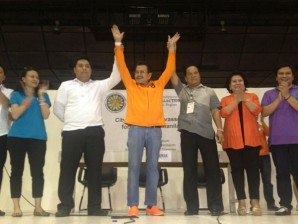
Former president Joseph Estrada is proclaimed mayor of Manila by the city’s Board of Canvassers after he defeats incumbent Alfredo Lim. With Estrada are members of his family, his wife Dr. Loi Ejercito and Sen. Jose “Jinggoy” Estrada, among others. ERIKA SAULER/INQUIRER
MANILA, Philippines — Late Monday night when initial results already indicated a victory, former President Joseph Estrada excused himself from the small crowd gathered in the vast living room of his Sta. Mesa residence.
Not exactly the most religious of men, he locked himself in the master bedroom, took a seat and went deep into prayer. Manila’s mayoralty beckoning, he had everything to thank God for.
The anticipated triumph was clearly small compared with his gigantic win in the 1998 presidential derby.
But with what happened between then and now—he was ousted in 2001, convicted of plunder, and jailed for six years—it was, hands down, the sweetest victory at this stage of his political career.
For Estrada, 76, heading the capital city would cement his political “legacy.” But it also threatens to expand the family dynasty, from San Juan City and now, Manila.
“It’s a legacy that I can be proud of,” he told the Inquirer shortly before he was proclaimed the next chief executive Manila, defeating Mayor Alfredo Lim by a margin of at least 30,000 votes.
Estrada rejected the idea of an expanding political dynasty, but admitted that a defeat in Manila would “affect” the political career of his sons, Senator Jose “Jinggoy” Estrada and JV Ejercito.
“I don’t think so. The bottom line is elections are still about the will of the people,” he said, insisting that family affiliation was no sure ticket to an elective position.
But that appears to have been the case in his home city of San Juan where his family has been deeply entrenched since 1969, the year he first assumed the mayoral post.
Nearly a half a century later, Estrada and his allies are still in control of its local politics.
Mayor Guia Gomez, the mother of his son JV Ejercito, is poised to win a second term via landslide. His granddaughter Janella Ejercito is also successful in her first foray into politics as a councilor.
Gomez’s running mate, Vice Mayor Francis Zamora, ran uncontested and garnered more than 30,000 votes. Zamora’s father Ronaldo is returning to the House of Representatives, beating Estrada’s niece Jana.
The Ronaldo Zamora-Jana Ejercito face-off reflected political cracks within the Ejercito clan, which could only widen long after the family patriarch is gone.
Jana was backed by Estrada’s son, Sen. Jinggoy Estrada, who served as San Juan mayor for nine years before he was replaced in 2001 by half-brother JV, who also remained in power for three terms.
JV Ejercito, who is expected to join Jinggoy in the Senate based on partial and unofficial results, supported the Gomez-Zamora ticket.
Jinggoy and JV do not see eye-to-eye in a rivalry supposedly triggered by the latter’s decision to replace his half-brother’s city hall employees when he became mayor.
As the half-brothers engage in their own political intramurals, the father has relocated to nearby Manila, the city of his birth and “for which I became famous.”
On Tuesday Estrada said he didn’t intend to stay long as mayor, probably aware of the limitations of age. He vowed to step down after three years and transfer the reins to his running mate, Vice Mayor Isko Moreno, who was born the year after Estrada entered politics.
Throughout the campaign period, he highlighted the apparent decay of Manila, its dirty streets, rising criminality, and purportedly vanishing revenue. He promised to make “concrete changes” by 2016, his vision contained in a long-term urban renewal plan.
Estrada was confident that Moreno would not digress from the vision later on. “Continuity” in terms of government programs, said the new mayor, is the “benefit” that comes with political dynasties, San Juan his prime example.
But other than his avowed desire to purportedly “save” Manila, Estrada’s mayoral run was driven by something much deeper and personal.
The events of 2001, when he was driven out of office, left him a beaten man, his ego bruised, his political career in ruins. In his first few years in jail, he said his attitude was sheer anger. Then he said he discovered the joys of forgiveness, the “attribute of the strong” he had learned from Mahatma Gandhi.
Since he was pardoned and released in 2007, he has campaigned for vindication.
Detractors eventually turned into allies, all apologizing for letting Estrada down. Most touching and significant to him was the public apology that came from former President Corazon Aquino, now deceased.
Estrada sought the ultimate vindication in 2010 when he ran again for president, only to lose to Aquino’s only son. That he placed second in the race—practically getting the same number of votes that he received in 1998 —was a victory of sorts.
“If Cory didn’t die, (her son) Noynoy would not have won,” he said.
That was the lone election he lost in more than four decades in politics. Three years later, he’s a winner once again, the victory “concretizing my vindication.”